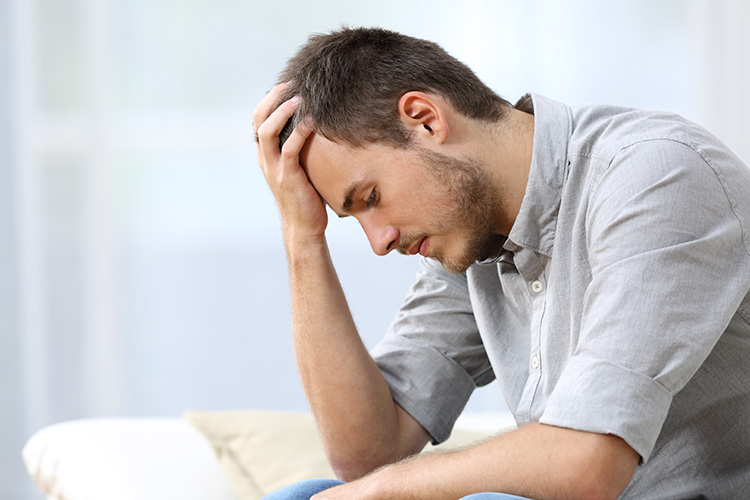Symptoms
What are common mental symptoms of anxiety?
People with generalized anxiety may experience a wide range of symptoms that may fluctuate over time. A common characteristic many people with GAD share is a fear of uncertainty, which can manifest itself in various ways. Some typical symptoms of generalized anxiety include:
- An attempt to control situations.
- An inability to stop the worrying cycle, even when knowing it’s irrational.
- Overthinking and obsessing over worst-case scenarios.
- Avoiding social situations or other opportunities.
- Constantly feeling on edge or unable to relax.
- Feelings of indecisiveness.
- Difficulty focusing.
What are common physical symptoms of anxiety?
While anxiety is a mental condition, it can also exhibit itself physically. Physical symptoms of anxiety include:
- Stomachaches.
- Headaches.
- Excessive perspiration.
- Difficulty sleeping at night.
- Trembling of the body and/or voice.
- Nausea.
- Bowel issues.
- Muscle aches or fatigue.
These lists are by no means an exhaustive collection of symptoms. Anxiety shows itself in different ways in different individuals. Speaking with a trained doctor can allow you to better understand if what you’re experiencing is generalized anxiety.
How does generalized anxiety disorder affect an individual’s life?
It’s important to note that depending on a person’s anxiety levels, they may function normally in social situations. Generalized anxiety ranges from mild to severe, and some individuals have anxiety mild enough to tolerate in social situations. Other people who suffer from anxiety may find it debilitating and challenging to navigate a typical lifestyle. A person’s anxiety can also fluctuate depending on the day, month, or even time of year.
Diagnosis
How do I get diagnosed with generalized anxiety?
The first step in treatment is generally diagnosis. An individual can be diagnosed with generalized anxiety following a period of at least six months in which they worry more often or not. They must also display three or more symptoms, which can be discussed with a trained physician.
In order to assess a person’s anxiety, a doctor may want to perform tests, such as:
- A physical exam.
- Blood or urine tests, if necessary.
- Psychological questionnaires.
- Asking any additional questions about your symptoms.
Treatment
Is generalized anxiety disorder treatable?
After your doctor has a better understanding of your anxiety and what symptoms you’re experiencing, they will be able to recommend treatment. Fortunately, there is a wide range of treatment options available for those suffering from generalized anxiety, some of which we offer at Specialty Clinic of Austin.
Lifestyle Changes
While some people with severe anxiety require medications or psychotherapy to see improvement, lifestyle changes can also make a huge difference. By practicing mindfulness and caring for your body and mind, you may find long-term relief from some of your most burdensome anxiety. Some positive changes you can make to your lifestyle include:
- Exercise and care for your body.
- Eat well-balanced, nutritious meals.
- Get enough quality sleep.
- Practice relaxation techniques, such as meditation, yoga, and breathing exercises.
- Avoid alcohol, drugs, and cigarettes.
Psychotherapy
For many suffering from generalized anxiety, it’s helpful to speak to a licensed psychiatrist, psychologist, or counselor. Cognitive-behavioral therapy (CBT) has been shown to be the most effective way of dealing with generalized anxiety. By speaking with a therapist, individuals can better manage their anxieties. Therapists teach patients coping mechanisms to help them break destructive cycles and deal with their worries in a more rational, healthy way.
Medications
Several medications are used to treat individuals with generalized anxiety disorders. Speak with your physician to determine if any of these options are right for you:
- SSRIs: Medications within the selective serotonin reuptake inhibitor (SSRI) and serotonin and norepinephrine reuptake inhibitor (SNRI) classes are commonly prescribed for anxiety. These include escitalopram (Lexapro), paroxetine (Paxil), and many more.
- Buspirone: A medication designed to combat anxiety, buspirone can be used daily to help mitigate the worst symptoms of your anxiety. It takes several weeks to reach full effectiveness in your system, as do most antidepressants.
- Benzodiazepines: For patients prone to panic or more severe anxiety, doctors may prescribe benzodiazepines on a limited-use basis. These can be used in situations when your anxiety is uncontrollable and provide nearly immediate relief.
How to Cope
While you may pursue one or more treatment routes to combat your generalized anxiety disorder, you won’t experience relief until you take action. Aside from following your treatment plan, the best ways to cope with anxiety disorders and excessive worrying are:
- Break your negative thought cycle.
- Spend time with those you care about.
- Focus on the present and release what you can’t control.
- Take action to get help by speaking with a doctor or psychiatrist.
Sources:
Generalized Anxiety Disorder (GAD): Anxiety and Depression Association of America, ADAA. Generalized Anxiety Disorder (GAD) | Anxiety and Depression Association of America, ADAA. https://adaa.org/understanding-anxiety/generalized-anxiety-disorder-gad#:~:text=Generalized%20Anxiety%20Disorder%20(GAD)%20is,difficult%20to%20control%20their%20worry.
Mayo Foundation for Medical Education and Research. (2017, October 13). Generalized anxiety disorder. Mayo Clinic. https://www.mayoclinic.org/diseases-conditions/generalized-anxiety-disorder/symptoms-causes/syc-20360803.
Mennin, D. S., Heimberg, R. G., Fresco, D. M., & Ritter, M. R. (2008). Is generalized anxiety disorder an anxiety or mood disorder? Considering multiple factors as we ponder the fate of GAD. Depression and anxiety. https://www.ncbi.nlm.nih.gov/pmc/articles/PMC5120742/.



